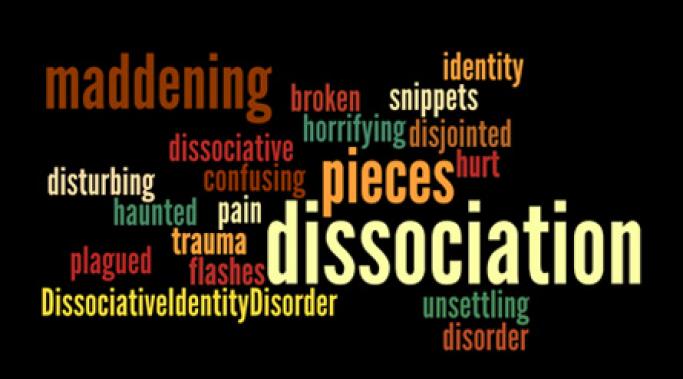If you have Dissociative Identity Disorder, recognizing when you're on a downward spiral may be incredibly difficult. Dissociation separates us from our thoughts, feelings, and experiences and makes maintaining awareness of our very realities a monumental challenge. My hope is that by taking stock of my mental health warning signs, I can increase my chances of noticing the next decline in functioning at its inception, rather than coming out of a dissociative fog six months in and wondering what happened to my life.
Living with DID
For some time now, my mental health has been declining. My partner admitted to me last night that if it were still possible to commit loved ones she would have had me hospitalized months ago. And though I didn't realize she was quite that concerned about my mental condition, she's been telling me that I'm not well for a while now. I've been unwilling to hear it, insulted by what I believed was a lack of faith in me and thoroughly annoyed at her refusal to recognize how brilliant and capable I truly am. Oh denial, my old friend, you've made me a fool once again. Sadly, I doubt it will be the last time. Because I still haven't learned to take mental health warning signs as seriously as I take my pride.
The man typed some figures and stared at the computer screen, eventually muttering, "You qualify for $440 a month in assistance. Your rent is $740. Don't know how you're going to do it." I stared at a rip in an orange, Naugahyde chair. I didn't know how I was going to do it either. It was the year I discovered what it's like to live on welfare (How to Get Disability Benefits for Mental Illness). I learned valuable lessons about poverty that I won't soon forget. And I came face-to-face with the realities of severe mental illness and invisible disability.
Near the bottom of the HealthyPlace homepage there's an audio widget, bordered in orange with the header Share Your Mental Health Experience. If you have a spare three minutes, please play the clip titled "I Hear A Voice in My Head" and listen to one woman poignantly illustrate why I write about Dissociative Identity Disorder. This woman, like so many others, is struggling in isolation with something she doesn't understand. "People act like it's nothing," she says. No matter the condition, there will always be people who act like it's nothing. Talking about mental illness, publicly and honestly, is the only way I know to ease that kind of invalidation.
I dreamed I was at the mall, shopping with my partner. We strolled through the stores, bought a few things, and went home. It wasn't a particularly noteworthy dream but I mentioned it in passing to her anyway. "That wasn't a dream," she said. "We did that yesterday." How did I confuse reality for a fiction created by my dreaming mind? Memory is a tricky thing and dissociation complicates remembering. It's only because I have dissociative identity disorder (DID) and am aware of my dissociative memory problems that I believed her when she said it wasn't a dream. It didn't, and still doesn't feel like a memory at all.
Anytime I'm traveling by car - whether I'm the driver or a passenger, whether it's a quick jaunt to the store or a half-day road trip - detailed visions of gruesome car accidents repeatedly interrupt my thoughts. These intrusive images are involuntary and a common symptom of posttraumatic stress disorder (PTSD) (typically comorbid in those with dissociative identity disorder). Until recently, I didn't understand why these particular intrusive images plague me so. I've never been in a serious car accident. It surprised me to learn what now seems obvious: any form of potential danger can trigger PTSD symptoms.
I'm thoroughly exhausted by the effort I expend to shield others from Dissociative Identity Disorder. I'm worn out on cleaning up the messes that inevitably occur when all that effort just isn't enough. I don't want to apologize for those messes anymore just now. I don't want to explain. I don't want to make speeches about personal responsibility and how I won't blame Dissociative Identity Disorder for problems directly related to - surprise! - Dissociative Identity Disorder. There are only so many guilty verdicts I can receive before I start to feel a little worthless. And I can only try so hard to protect the people around me from DID before I'm depleted.
If I'd kept quiet about my brush with hospitalization a couple of weeks ago, my doctor would have been the only person who knew anything was seriously wrong. I missed a blog post the following Monday, but easily could have feigned some other, less embarrassing emergency. We were in the midst of moving and still managed, with a great deal of help that would have been necessary either way, to get the old place emptied and the new one full. Even my family didn't realize the jeopardy I was in. How is it possible to be desperately unwell and no one know? Dissociative Identity Disorder makes passing as normal not only possible for me, but nearly unavoidable.
I'm one of many people with dissociative identity disorder (DID). I lose time, regularly forget pretty important stuff, and I have alters who behave according to their perceptions of the world, not mine. How does that translate to daily life? I mess up - badly and often. As I see it, the fact that I can't control DID is beside the point when it comes to personal responsibility. I don't believe my mental illness entitles me to some bad behavior or extra leniency. But just like I can't use DID as an excuse, neither can anyone else.
My friend Dana recently moved to a new city and has searched fruitlessly for a therapist for months. Finding quality treatment for dissociative identity disorder (DID) is often one of the most frustrating challenges of living with DID. Despite the fascination it holds for many people, DID isn't widely understood, even among mental health professionals. Like so many others, Dana is in a position where she may have to choose between an inexperienced therapist and no therapist at all.








